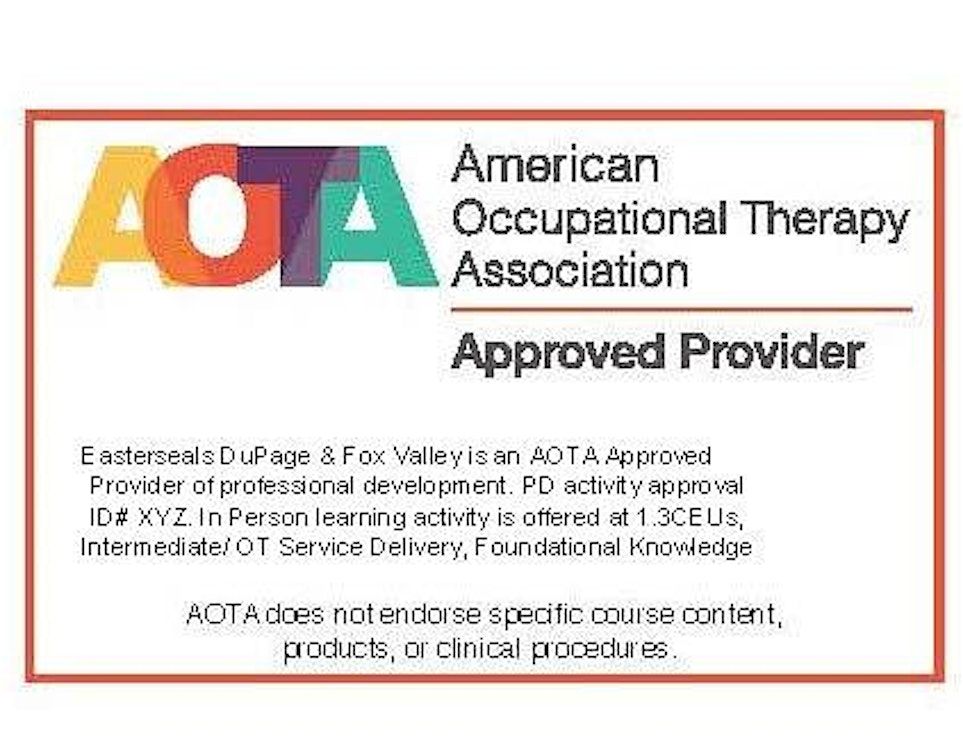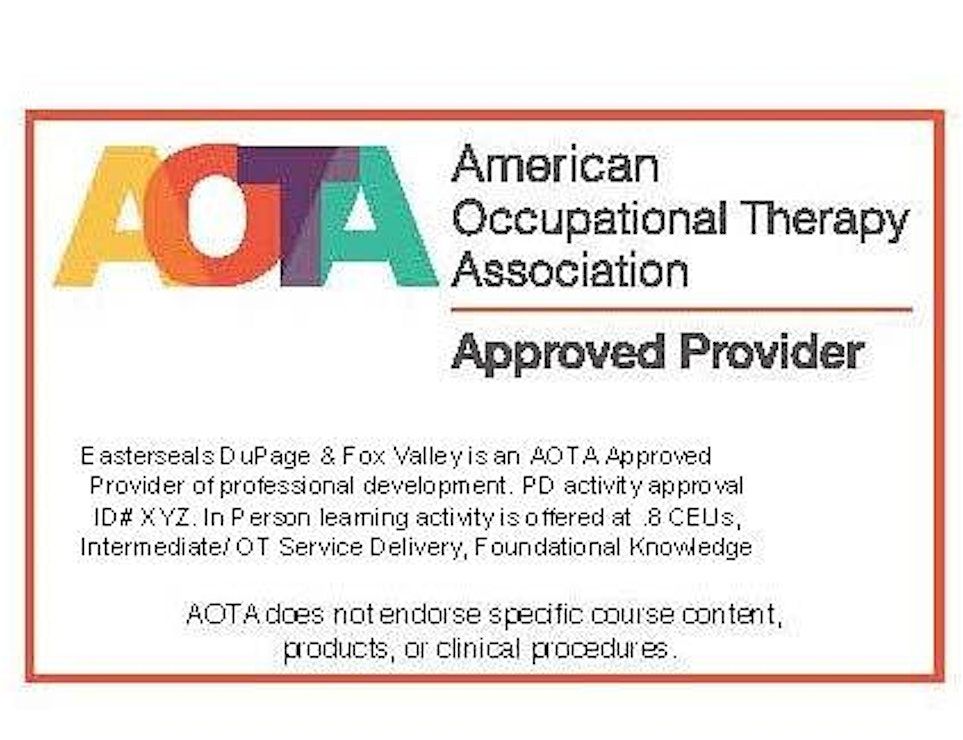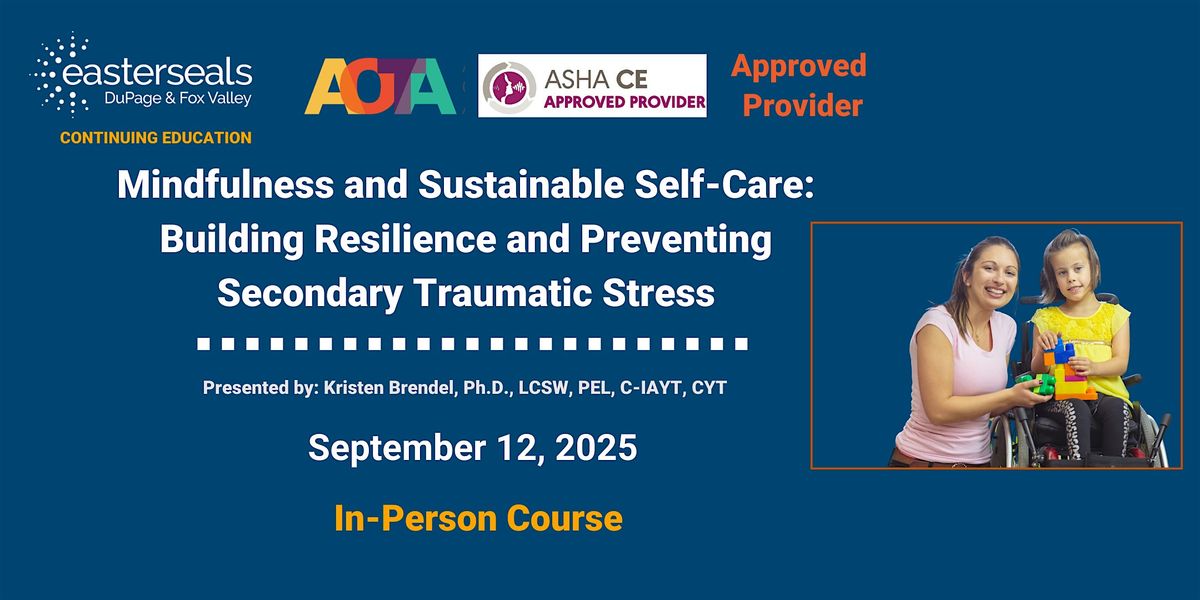LINKED: Breathing & Postural Control
Schedule
Fri, 16 May, 2025 at 07:30 am to Sun, 18 May, 2025 at 02:00 pm
UTC-05:00Location
Easterseals DuPage & Fox Valley | Villa Park, IL

About this Event
Click here for Full Course Details Including Objectives.
To sign up and receive all course information and future courses from Easterseals, please click here to sign-up.
Summary
This introductory course has revolutionized the way therapists treat patients by assessing the body’s core, from vocal cords to the pelvic floor. Participants will leave this course learning quick interventions to improve functional outcomes in patients.
Course Description
This course, developed by Dr. Mary Massery, proposes a new definition of core stability; redefining it as the dynamic control of trunk pressures to optimize postural stability (balance). Dr. Massery’s novel “soda pop can model” links breathing mechanics to postural control using multi-system interactions. In Linked 1, foundational information and quick interventions will be the focus(positioning and ventilatory strategies). Multiple clinical cases will be used to cement the concepts,as will a live patient demonstration (if available). The course is applicable for any pediatric or adult patient(or therapist) who breathes!
LINKED Part-2 builds upon the foundational information presented in “LINKED Part-1.” In Part-2, the focus shifts to assessing “normal” breathing patterns, and learning neuromotor breathing retraining techniques and manual assistive cough techniques during hands-on labs.
Objectives:
At the conclusion of Linked 1 (Day-1), participants should be able to:
- Describe how trunk pressures link breathing and postural control using the Soda Pop Can Model.
- Describe the multiple, simultaneous roles of the diaphragm as related to breathing, postural control, gastroesophageal reflux, constipation, and venous return.
- Demonstrate the role of the vocal folds in normal postural stability responses (balance) and make the case for using speaking valves for patients with tracheostomies.
- Position patients for optimal physiological and biomechanical support of breathing with simple equipment (towels, pillows, etc.).
- Use a ventilatory strategy algorithm presented in class to optimally match breathing with movements from bed mobility to athletic endeavors.
- Apply concepts to a wide variety of patient populations from infancy to geriatrics.
At the conclusion of Linked 2 (Days 2- 3), participants should be able to:
- Use a multi-system approach to evaluating motor impairments.
- Identify the variations of “normal” breathing patterns and discuss the efficiencies/inefficiencies for individual patient conditions.
- Evaluate need for, and demonstrate, appropriate neuromotor retraining techniques for patients with ineffective breathing/postural control strategies (health or participation deficits).
- Participate in a live patient demonstration (if a patient is available) and suggest possible evaluation and treatment ideas based on the course material.
- Design a targeted airway clearance program using the principles of mobilization, expectoration and oral management.
- Demonstrate airway clearance techniques, with an emphasis on manual assistive cough techniques, and apply an airway clearance algorithm to specific patient conditions.
- Identify thoracic cage/spine restrictions as they pertain to breathing mechanics and postural control (a very brief introduction of chest wall restrictions).
- Evaluate the need for, and demonstrate, neuromotor retraining techniques to improve breath support for voicing and postural control (eccentrics).
- Suggest immediate ways to incorporate the concepts into therapy activities in your clinical setting.
Target Audience:
This course will be of interest to Physical Therapists, Occupational Therapists and Speech Language Pathologists.
Educational level: Intermediate
About the Instructor:
Mary Massery, PT, DPT, DSc
Dr. Massery received her BS in Physical Therapy from Northwestern University in 1977, her DPT from the University of the Pacific in 2004 and her DSc from Rocky Mountain University in 2011. Her publications and interests focus on linking motor behaviors to breathing and/or postural mechanics in both pediatric and adult patient populations. Dr. Massery has been invited to give over 1,000 professional presentations in all 50 US states and in 18 countries worldwide, including more than 100 presentations for the American Physical Therapy Association. Mary’s research pioneered the concept of managing trunk pressures as a new way to visualize core stabilization. She has delivered keynote and major addresses on topics such as cystic fibrosis and posture, pectus excavatum (chest deformities), connections between posture & breathing, and PNF (proprioceptive neuromuscular facilitation). Mary has received national awards from the APTA, including its highest clinical award, The Florence Kendall Practice Award, honoring “one’s outstanding and enduring contributions to the practice of physical therapy." She has been honored as Outstanding Alumnus of the Year by each of her 3 universities. She was also awarded Northwestern University’s Alumnae Research Achievement Award. Mary continues to maintain a private practice in Chicago, specializing in breathing and postural dysfunction.
Disclosure Statement: Dr. Massery has the following financial relationship to disclose: she receives a fee for speaking from Easterseals DuPage & Fox Valley. She has no relevant nonfinancial relationships to disclose.
Course Credits:
Continuing education credits for O.T./ S.T / P.T will be offered through the Illinois Department of Financial and Professional Regulation.
This course is a total of 2.1 CEUs (.8 for day 1 and 1.3 for day 2-3) that would be received through ASHA and AOTA.
Early Intervention credits have been requested for day one and for day 2-3, with a combined 21 contact hours for the full course.
Activity Completion Requirements
All participants will receive a course completion certificate upon successful completion of the conference. No certificates will be awarded until course completion is verified on the final date of the conference.
Please Note: Linked 1 is a prerequisite to register for Linked 2. Linked 1 can be taken as a stand-alone course. Course completion certificates can be sent to [email protected] to confirm the Linked 2 prerequisite.




Program Schedule
Linked 1- Lecture
7:30-8:00 – Registration/check in
8:00-8:20 – Introduction to course topics
8:20-9:45 – Breathing and posture: Pressure control (Soda pop model)
9:45-10:00 – Break
10:00-11:30 – Positioning strategies: What can you do in 90 Seconds or less that has a profound and lasting effect?
12:15-1:15 – Lunch
1:15-1:35 – Sneak peek: Ventilatory/movement strategies
1:35-3:15 – Breathing and posture: The internal organs. The vocal folds.
3:15-3:30 – Break
3:30-5:10 – Ventilatory/movement strategies: Integrating neuromuscular, musculoskeletal, respiratory and sensory systems
5:10-5:30 – Summary, “Pearls,” sleep homework
Linked 2 - LAB
7:30-8:00 – Coffee
8:00-8:30 – Review, synthesis, and Q&A
8:30-9:45 – Chest assessment: Focus on musculoskeletal alignment and breathing patterns
9:45-10:00 – Break
10:00-11:30 – Assessing breathing patterns and postural implications
11:30-12:30 – Lunch
12:30-1:15 – Airway clearance: From Sherlock to solution
1:15-2:15 – Facilitating efficient breathing patterns and endurance training: Neuromotor techniques for diaphragm, chest and other breathing patterns
2:15-2:30 – Break
2:30-4:00 – Facilitating breathing patterns (continued)
4:00-4:30 – Brief introduction to rib cage and trunk musculoskeletal restrictions associated with breathing difficulties – Quick Screening!
4:30-5:30 – Patient demonstration (if possible)
Linked 2 Extended - LAB
7:30-8:00 – Coffee
8:00-8:30 – Review, synthesis, and Q&A
8:30-10:00 – Differential diagnosis: “Find the Problem”
10:00-10:15 – Break
10:15-11:30 – Airway clearance lab: Focus on manual assistive cough techniques
11:30-12:15 – Lunch
12:15-1:30 – Eccentric trunk control: using voice for postural control and vice versa
1:30-2:00 – Homework: Putting it all together, Course wrap up
Where is it happening?
Easterseals DuPage & Fox Valley, 830 South Addison Avenue, Villa Park, United StatesEvent Location & Nearby Stays:
USD 263.28 to USD 708.47



